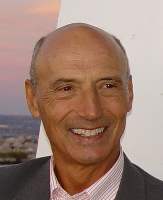|
|
|
Plenary talks > Ioan D. Landau
Plenary Session

Wednesday July 3, 14:10—15:10
Speaker
Ioan D. Landau
Emeritus Research Director at C.N.R.S.
GIPSA-LAB, Control Dept, Grenoble, France
Title
Adaptive Attenuation of Unknown and Time Varying Disturbances
Abstract
In many classes of applications like active vibration control and active noise control the disturbances can be characterized by their frequencies content and their location in a specific region in the frequency domain. The disturbances can be of narrow band type (simple or multiple) or of wide band type. A model can be associated to these disturbances. The knowledge of this model allow to design an appropriate control system in order to attenuate (or to reject) their effect upon the system to be controlled. The attenuation of disturbances by feedback is limited by the Bode Integral and the “water bed” effect upon the output sensitivity function. In such situations the feedback approach has to be complemented by a “feedforward disturbance compensation” requiring an additional transducer for getting information upon the disturbance. Unfortunately in most of the situations the disturbances are unknown and time varying and therefore an adaptive approach should be considered. The generic term for adaptive attenuation of unknown and time varying disturbances is “adaptive regulation”. While the classical adaptive control paradigm deals essentially with the construction of a control law when the parameters of the plant dynamic model are unknown and time varying, in adaptive regulation, the plant model is assumed to be known and almost invariant and the objective is to adapt the parameters of the controllers in order to attenuate (or to suppress) the disturbance despite that its model is unknown or time varying.
The talk is divided in tow parts:
The first part will review the actual status in adaptive regulation of multiple unknown and time varying narrowband disturbances by adaptive feedback. The basic adaptive regulation schemes will be described and some experimental results in active vibration control will be presented. The second part of the paper will review recent developments in adaptive feedforward compensation algorithms in the presence of the inherent internal positive feedback caused by the coupling between the compensator system and the measurement of the image of the disturbance. Some experimental results in active vibration control will illustrate the performance of these algorithms. The beneficial effect of adding a fixed feedback will be enhanced together with its influence upon the stability of the adaptive system. A brief presentation of some open research problem will conclude the talk.
Biography
Ioan Doré LANDAU is Emeritus Research Director at C.N.R.S.(National Centre for Scientific Research) since September 2003 and continues to collaborate with the Laboratoire d'Automatique de Grenoble (CNRS/INPG) of the Institut National Polytechnique de Grenoble. His research interests encompass theory and applications in system identification, adaptive control, robust digital control and nonlinear systems. He has authored and co-authored over 200 papers on these subjects. He is the author of the books: Adaptive Control - The Model Reference Appoach (Dekker 1979) translated also in chinese, System Identification and Control Design (Hermès 1993, Prentice Hall 1990), and co-author (with M. Tomizuka) of the book Adaptive Control - Theory and Practice (in Japanese - Ohm 1981) as well as co-author (with R. Lozano and M. M‚Saad) of the book Adaptive Control (Springer 1997) and co-author (with G. Zito) of the book Digital Control Systems (Springer 2005). He holds also several patents and was at the origin of several software packages in control developped by ADAPTECH. He advised 35 PhD students. He delivered a number of Plenary Talks at International Conferences including American Control Conference in Seattle in 1995, CIFA 2008 (Bucarest), MED-09 (Thessaloniki). He was the key note speaker at the European Control Conference in Bruxelles in 1997.
Dr. Landau received the Rufus Oldenburger Medal 2000 from the American Society of Mechanical Engineering which recognizes significant contributions to the field of automatic control for his pioneering contributions in adaptive control and system identification.He is "Doctor Honoris Causa" of the Université Catholique de Louvain-la- Neuve (2003). He was a R. Springer Professor at University of California, Berkeley, Dept.of Mechanical Engineering in 1992. He received the price Monpetit from the French Academy of Science in 1991, the "Best Review Paper Award (1981-84)" for his paper on adaptive control published in ASME Journal of Dynamical Systems Measurement and Control, the C.N.R.S. Silver Medal in 1982 and the Great Gold Medal at the Invention Exibition Vienna in 1968 for his patent on the variable frequency control of asynchronous motors. He was an IEEE-CSS "Distinguished Lecturer" for 2001-2003. He is IFAC Fellow since 2007 and received the Life Achievement Award from MCA in 2009.
He received the degree of Docteur-es-Sciences Physiques from the University of Grenoble. Before joining the C.N.R.S. in 1976 as research director, he was an Associate Professor at the Institut National Polytechnique de Grenoble from 1973 to 1976, a Senior Post-doctoral Research Associate at NASA - Ames Research Center in 1971-72 and a research engineer at ALSTHOM in 1969-71 and 72-73.
At C.N.R.S. he was the Director of co-ordinated research programs: "Mathematical Tools and Models for Control, System Analysis and Signal Processing" from 1979 to 1982, "Adaptive Systems in Control and Signal Processing" from 1984 to 1988 and "Automatique" from 1988 to 1996. He was also Director of the Laboratoire d'Automatique de Grenoble from 1987 to 1990.
Dr. Landau was the General Chairman of the first European Control Conference organised in Grenoble in 1991. He was one of the founders and the first President of the European Community Control Association (ECCA) from 1991 to 1993 (now EUCA) and he was Editor in Chief of the European Journal of Control (a publication of the European Union Control Association) from 1994 to end 2002.
In June 1998 the CNRS organized an international colloquium in his honor "Perspectives in Control - Theory and Applications". The proceedings of the colloqium (D. Normand-Cyrot, ed.) have been published by Springer Verlag.

